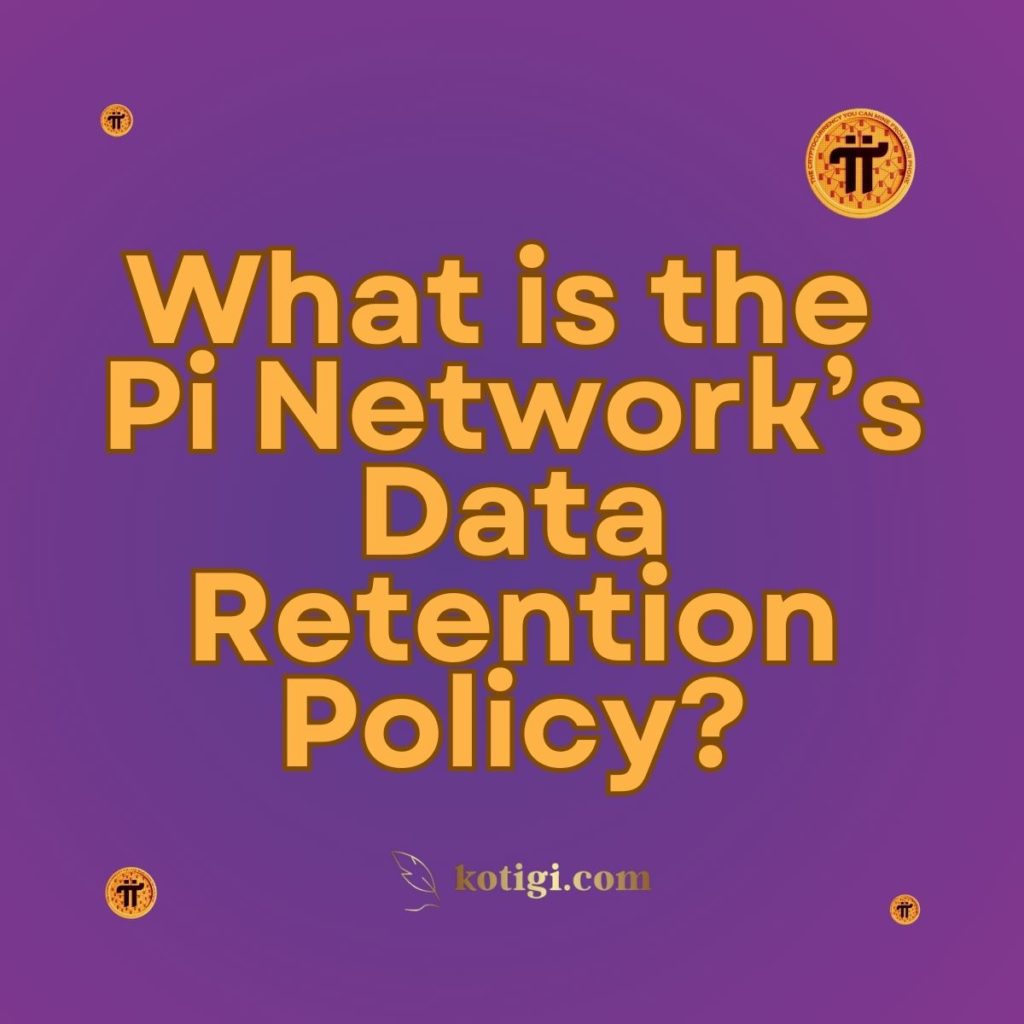
What is the Pi Network’s Data Retention Policy?
The Pi Network’s data retention policy outlines how the platform collects, uses, and stores user data while ensuring compliance with legal requirements and maintaining user privacy. This policy is designed to protect users’ personal information, establish transparency in data handling practices, and enhance trust within the community. By implementing a well-defined data retention policy, the Pi Network aims to balance operational needs with user privacy concerns. For more details, refer to the Pi Network Privacy Policy here.
Introduction
In an era where data privacy and security are paramount, cryptocurrency platforms like the Pi Network must establish clear data retention policies to protect user information and comply with legal regulations. The Pi Network recognizes the importance of responsible data management and has developed a comprehensive data retention policy that governs how it collects, processes, and stores user data. This article will delve into the key aspects of the Pi Network’s data retention policy, its implications for users, and the importance of adhering to data protection principles.
Understanding Data Retention Policy
Definition of Data Retention
Data retention refers to the policies and practices that govern how organizations store user data before it is deleted or anonymized. This process is essential for ensuring compliance with legal obligations, protecting user privacy, and maintaining data integrity. A well-defined data retention policy helps organizations balance the need for data storage with users’ rights to privacy and data protection.
Importance of Data Retention Policies
Data retention policies are crucial for several reasons, including:
- Legal Compliance: Organizations must adhere to data protection laws and regulations that dictate how long personal data can be retained. Non-compliance can result in legal consequences and financial penalties.
- User Trust: By establishing clear data retention practices, organizations can enhance user trust. When users know how their data is handled, they are more likely to engage with the platform and feel secure in their interactions.
- Data Security: Implementing a data retention policy helps mitigate the risk of data breaches by ensuring that unnecessary data is not retained longer than necessary. By regularly reviewing and deleting outdated information, organizations can reduce their attack surface.
Key Components of Pi Network’s Data Retention Policy
Data Collection Practices
The Pi Network collects various types of data from its users to facilitate the operation of its platform. This data may include:
- Personal information, such as name, email address, and phone number
- Account information, including transaction history and mining activity
- Technical data, such as device information and IP addresses
The data collection practices of the Pi Network are designed to be transparent and relevant to the services offered. Users are informed about the types of data collected and the purposes for which it is used.
Purpose of Data Retention
The Pi Network retains user data for specific purposes, including:
- Service Improvement: The data collected helps Pi Network analyze user behavior, enhance platform functionality, and develop new features to improve user experience.
- Regulatory Compliance: User data may be retained to comply with legal and regulatory requirements, including KYC (Know Your Customer) obligations.
- Security Measures: Retaining certain data allows the Pi Network to monitor for suspicious activities, detect fraud, and implement security measures to protect users and the platform.
According to the Pi Network Privacy Policy, the organization retains information as long as necessary to fulfill these purposes, prevent fraud, resolve disputes, and comply with legal requirements. This includes evaluating the nature and sensitivity of personal information, potential risks, and applicable legal obligations. In some cases, anonymized data may be used indefinitely, as it can no longer be associated with an individual.
Retention Periods
The Pi Network’s data retention policy outlines specific retention periods for various types of data. These periods are based on legal obligations, operational needs, and the nature of the data collected. Generally, data is retained for as long as necessary to fulfill its intended purposes and comply with legal requirements.
Once the retention period expires, the data will be securely deleted or anonymized to protect user privacy. The platform aims to strike a balance between retaining data for operational purposes and minimizing the risk of exposing sensitive information.
User Rights and Data Access
Under the data retention policy, users have certain rights regarding their personal data, including:
- Access: Users have the right to request access to their personal data held by the Pi Network. This allows them to understand what information is collected and how it is used.
- Correction: Users can request corrections to any inaccurate or incomplete data associated with their accounts.
- Deletion: Users have the right to request the deletion of their personal data under certain circumstances, such as when it is no longer necessary for the purposes for which it was collected.
The Pi Network is committed to upholding these rights and providing users with control over their personal information.
Compliance with Data Protection Regulations
Adherence to GDPR and Other Regulations
The Pi Network aims to comply with data protection regulations, including the General Data Protection Regulation (GDPR) in the European Union. This regulation establishes strict guidelines for data collection, processing, and retention, ensuring that users’ rights are respected.
By adhering to such regulations, the Pi Network not only enhances its credibility but also reinforces its commitment to user privacy and data protection.
Regular Reviews and Updates
To maintain compliance with evolving data protection laws, the Pi Network regularly reviews and updates its data retention policy. This proactive approach ensures that the platform remains aligned with best practices in data management and that users’ rights are protected.
Importance of Transparency and Communication
Informing Users about Data Practices
The Pi Network places a strong emphasis on transparency regarding its data retention practices. Users are provided with clear and accessible information about how their data is collected, used, and retained.
This transparency fosters a sense of trust within the community, as users feel informed about their rights and the measures taken to protect their personal information.
Open Channels for User Inquiries
The Pi Network encourages users to reach out with questions or concerns regarding data retention and privacy. By maintaining open channels of communication, the platform demonstrates its commitment to addressing user inquiries and enhancing user confidence in its data practices.
Security Measures for Data Protection
Securing User Information
The Pi Network employs industry-standard security measures designed to protect the security of all information submitted through its services. These measures include encryption, access controls, and regular security assessments. However, it is essential to note that the security of information transmitted over the internet can never be entirely guaranteed.
The Pi Network is not responsible for any interception or interruption of communications or for data losses. Users are advised to maintain the security of their authentication methods, such as passwords and biometric data. In the event of any suspected security breach, the Pi Network may suspend user access to services without notice to protect user data during an investigation.
Future Considerations in Data Retention
Evolving Data Management Strategies
As the Pi Network continues to grow and adapt to changing technological landscapes, its data retention policy may evolve. The platform is committed to exploring new strategies for data management that prioritize user privacy while allowing for operational efficiency.
This includes considering innovative technologies and approaches that enhance data security and streamline retention processes.
Balancing Data Retention with User Privacy
The challenge of balancing data retention with user privacy will remain a focal point for the Pi Network. By continually assessing its data retention practices and seeking user feedback, the platform aims to create a harmonious environment where data is retained responsibly while prioritizing user rights.
Conclusion
The Pi Network’s data retention policy is a fundamental aspect of its commitment to user privacy, security, and regulatory compliance. By clearly outlining its data collection practices, retention periods, and user rights, the platform fosters trust and accountability within the community. As the landscape of data protection evolves, the Pi Network remains dedicated to enhancing its policies and practices to ensure a safe and secure environment for all users.
Key Takeaways
- The Pi Network’s data retention policy governs how user data is collected, used, and stored.
- Data is retained for specific purposes, including service improvement, regulatory compliance, and security measures.
- Users have rights to access, correct, and request deletion of their personal data.
- Compliance with data protection regulations, such as GDPR, is a priority for the Pi Network.
- The platform emphasizes transparency and open communication regarding its data practices.
- User information is secured through industry-standard measures, and users must also take responsibility for their security.




